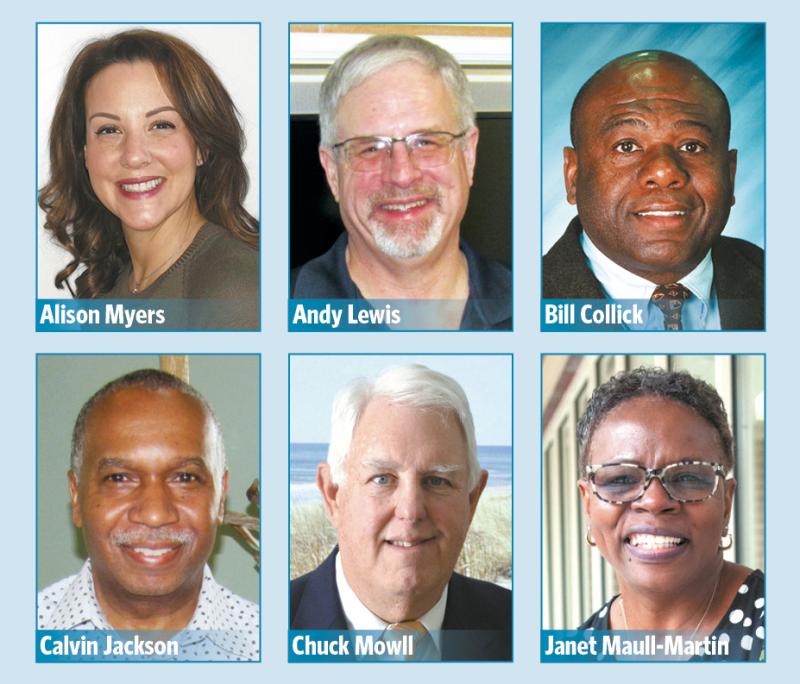Cape Henlopen School District voters go to the polls Tuesday, May 14, to elect three school board members.
Incumbent Andy Lewis and Janet Maull-Martin will compete for the Area C seat; Calvin Jackson is challenging incumbent Alison Myers for an at-large seat. Both are five-year terms.
Chuck Mowll and Bill Collick are running to fill the last year of board member Roni Posner’s at-large seat.
Candidates provided a short biography of themselves and answered three questions. Biographies and answers are provided in alphabetical order, and responses were edited to be 100 words or less.
Name: Bill Collick
Age: 67
Address: Milton
Family: Wife Nancy, daughter Dana, son Billy, granddaughters Jaia, Makena and Harper
Education: 1970 Cape High graduate, associate’s degree from Wesley College, bachelor’s degree from University of Delaware and master’s degree from Wilmington University
Relevant employment: 43 years in education
Relevant experience: five years teaching, 20 years college coaching/administration,18 years high school coaching and administration
Top reason for running: desire to stay connected in education
Name: Calvin Jackson
Age: 60
Address: Lewes
Family: married for almost 36 years with three adult children
Education: bachelor’s degree in English/journalism from Tougaloo College in Tougaloo, Miss.; graduate work at University of Minnesota, Minneapolis, Minn.
Relevant employment: I worked for the National Institutes of Health in the Office of Communications and Public Liaison for almost 35 years. I had the privilege to serve on the Management Intern Program, which offers a two-year opportunity to rotate through different administrative careers, gain insight into the NIH and develop a network of professionals. I served as an official and unofficial mentor to dozens of interns over a 10-year period (oftentimes having more than one mentee at a time), received the Mentor of the Year Award, and was selected to give the opening speech at the 2016 graduation ceremony.
Relevant experience: Former member of Father’s Circle, African-American fathers who worked with the Montgomery County, Md., school system to address the achievement gap and disciplinary disparities. After one year, the program saw a decrease in suspensions among African-American male students and an increase in their overall GPA. With the Minority Community Liaison Committee, I worked with Cape staff to address the lack of diverse teachers. This included developing a list of historically black colleges and universities, and colleges with a high percentage of minority students near the Cape district. As a result, the district hired five Hispanic teachers and five African-American teachers.
Top reason for running: I am running for an at-large seat on the Cape Henlopen school board to ensure that all students in the district have the same opportunity to receive a great, quality education.
Name: Andy Lewis
Age: 56
Address: Lewes
Family: wife Carrie, sons Danny (2015 Cape graduate) and Wes (2018 Cape graduate)
Education: bachelor’s degree chemical engineering from University of Delaware, master’s degree in chemical engineering from University of Idaho
Relevant employment: 28 years as an engineer, last 24 at Lewis Research in Lewes
Relevant experience: 10 years on the Cape school board, Lewes Little League president seven years, District 3 Little League staff eight years and last two as district administrator, my engineering employment
Top reason for running: To help Cape Henlopen School District provide the best education in the country for all our students
Name: Janet Maull-Martin
Age: 66
Address: Lewes
Family: husband Gavin Martin, son JD Maull and granddaughter Jaidyn Maull
Education: Cape Henlopen High School 1970; Warren Wilson College, Swannanoa, N.C., 1975; master’s degree in curriculum and instruction, Delaware State College, 1993
Relevant employment: Retired
Relevant experience: 35+ years of service in Cape district
Top reason for running: I’m running to use my experience and understanding as an educator to have a positive impact on district policies that will benefit all students.
Name: Charles “Chuck” Mowll
Age: 69
Address: Lewes
Family: Married for 36 years to Darlene, who suddenly passed away on Jan. 5 from adenocarcinoma. Sons Brian, Ryan and Christopher and five grandchildren. Two grandchildren attend Rehoboth Elementary, the same school building that was Rehoboth High School which I attended.
Education: master’s degree in public health, Rutgers University; undergraduate degrees from University of Delaware and Widener University; president, Class of 1967, Rehoboth High
Relevant employment and experience: During 40-plus years as a healthcare executive, I developed an expertise in safety, high reliability and harm prevention that will allow me to help the district improve safety and security of its nine schools and benefit our nearly 5,700 students and 1,000 staff. I was also an American Society for Quality certified Six Sigma Black Belt which represents strong skills and abilities needed to manage change and improve processes and systems.
Top reasons for running: We need to make our schools safer and more secure. We need to reduce the stress and workload burden on teachers. I would advocate for more planning time, limited class sizes and more counselors to help handle student citizenship issues. We need a larger commitment to curriculum development. Student SAT scores are below desired levels and students with learning deficiencies need more assistance. I will push for expanded programs to improve academic performance and academic growth scores.
Name: Alison Myers
Age: 41
Address: Lewes
Family: Husband, Rob, and children Bella (15), Aubrie (13), Rylie (10), Robbie (8), and Bryn (2)
Education: bachelor’s degree in economics, master’s degree in special education and doctorate in educational leadership, all from the University of Delaware
Relevant employment: secondary special education teacher in the Lake Forest and Colonial School Districts for nine years total.
Relevant experience: Cape Henlopen Board of Education (2014-present), Board of Education president (2018-present), Board of Education vice president (2015-2017), citizen member of the facilities task force III (2012-2014) and citizen’s budget oversight committees (2013-2014), and secretary of the Shields Elementary PTO (2012-2014).
Top reason for running: Education is my passion as well as my area of expertise. I have a vested interest in the success of the Cape Henlopen School District and am committed to the success of all students by meeting the needs of each student.
What is the top challenge the district faces and how do you propose to address it?
Collick: Maintaining the district’s budget while facing rising costs and cuts in education; student enrollment and the ability to serve the needs of all students; school climate and the ability to hire and maintain an excellent, engaging and diverse staff. The district must be able to find ways to do more with less, while projecting future enrollment in order to maintain workable class sizes and school space. The ability to hire a diverse and engaging staff will promote academic excellence and code of conduct adherence as we seek to address the needs of all students.
Jackson: I think the top challenge that the district faces is lack of parental involvement. Parent involvement has a direct impact on student achievement and teacher motivation. As a board member, I would encourage more engagement which informs parents about the school's academic programs, how they work and how their student can benefit. I would also support more personal contact with parents, including in-person conferences and curriculum nights. Communication should include weekly or monthly folders of student work sent home for parent review and comment. I would also encourage the board to hold listening sessions with parents in their communities.
Lewis: Growth. With the support of our community, we are addressing it in the most basic way by building, renovating or expanding our facilities to house our students. However, this is only one aspect of the issue. We also have to address the funding of teachers, staff and programs which grow with the number of students. We are going to need to ask our community for more funding. The key is for the board and district to be transparent, and clearly define and explain our needs so the community understands the investment we are asking them to make.
Maull-Martin: Our school system is a calling card for homebuyers, and our district is one of the fastest-growing areas. We’ve recently built three elementary schools, and a new middle school is on the way. We are outgrowing our buildings within years. We should include figures based on permits for new houses in planning, maximize use of current classrooms, revisit existing feeder patterns and explore ways to foster developer investment. Districts in Kent and New Castle counties assess an impact fee to developers. We should explore ways to ensure students have resources to succeed and are not harmed by overdevelopment/underfunding.
Mowll: Making Cape Safe is job one. We need a comprehensive approach to improve safety and security in our schools, and prevent harm from gun violence. This includes prevention strategies and protection mechanisms to provide social-emotional instruction for students, strengthen physical barriers and add school-based mental health services. The district should seek assistance from Homeland Security and complete its school safety survey. The Federal Commission on School Safety December 2018 report analyzed 32 school shootings and offers recommendations to keep students and teachers safe. I would urge the district to adopt these recommendations to eliminate the School Safety Gap.
Myers: The greatest challenge facing the district is increasing student enrollment, which has a ripple effect across nearly all areas of district operations. Thankfully, we have a supportive community that has approved multiple referendums, allowing the district to renovate/build new schools. However, the district must find operating funds for teachers, specialists, curriculum materials, technology, etc. Our board is addressing this by conducting budget prioritizing exercises to ensure our district can sustain funding needed to keep class size low, continue the technology renewal cycle, purchase new/additional curriculum, and fund other priority items to meet the diverse needs of our students.
What three steps must the district take to close the achievement gap?
Collick: In order to close the achievement gap, the district must target and focus on the needs of students who are deficient in certain areas. We must do this at an early juncture (kindergarten) in the lives of students. We must place our most needy students with our best instructors, as well as placing our most needy students in a mentoring program.
Jackson: I would support greater investments in pre-K programs to narrow the achievement gap between students before they begin school. I would also encourage the district to provide more supplementary academic programs for all children. The lack of academic programs during summer vacation negatively impacts the opportunities for academic success of low-income children. Teachers’ expectations also have a significant impact on student achievement. As a school board member, I would also advocate for strategies such as providing mentors for at-risk students, and involving high school students in community activities and service.
Lewis: One, maintain the goal of closing the achievement gap as a top priority. Two, continue the efforts which are being implemented but evaluate the effectiveness of the different methods and shift focus to those methods that provide greater rates of success, and where possible expand those efforts if new funding can be found. Three, research and implement new methods which have proven successful at reducing the gap.
Maull-Martin: Closing the achievement gap is a huge task because these children come to us lacking critical skills; their performance often results from socioeconomic influences. The district must evaluate what it is already doing to know whether efforts are producing results. We have to drill home to parents that education starts at home, and motivate them to root for their children in the classroom and the playing surface. We have to look at school funding allocation to ensure adequate resources and expand horizons to educate in a culturally competent environment that considers all students and extend opportunities through pre-K programming.
Mowll: English proficiency scores for fifth-graders were 79 for white students, 58 for low-income students and 45 for African-American students. In math, white students scored 68, low-income students scored 42 and African-American students scored 26. Cape provides opportunities for advanced academic students, Little Vikings for 3-4-year-olds that need special education and Intensive Learning Centers for students with severe learning, behavioral or emotional problems. The district needs to accelerate learning for low-income and African-American students. I propose a program called Coaching to Advance Proficiency in Academics for identified students and their parents or guardians which provides an intensive curriculum.
Myers: To address the achievement gap, our district must first ensure students are in class and ready to learn. Strategies such as restorative practices and trauma-informed care, coupled with a consistent and fair code of conduct, provide an environment where students are able to learn. Secondly, our district must uphold the belief that all students can achieve their potential. This is supported by providing all students with high-quality instruction for both college preparation and vocational programs. Finally, our district must look to implement a pre-K program in each of its elementary schools to meet the needs of our youngest learners.
Are district schools safe for all students and employees? Explain.
Collick: I do believe that all schools in the Cape Henlopen School District are safe for employees and students. Currently, schools in the district have emergency plans and immediate actions checklists for school issues that may place the campus in danger. The quick reference guide covers everything from intruder response, bomb threats, fire-evacuation, fire, medical emergency, kidnapping and severe weather.
Jackson: The Cape Henlopen School District does have a comprehensive plan in place to ensure that students and employees are safe. All schools are locked to outsiders and visitors have to be buzzed into the school office. Training in the schools involving staff and an SRO focus on plans to deal with intruder and active-shooter scenarios, lockdown drills, safety plans in coordination with local emergency responders and reviewing building floor plans. The most effective deterrent to school violence involves constant emergency preparedness training among school staff. Online subscription-based programs have also proven to be effective.
Lewis: The real question is, “Are we safe from tragedies as we have seen at other schools?” The answer is no. No school can be that is open to parents and the public and is not built like a prison complex. We are focused on making our schools as safe as possible given the building designs and the funds available. This includes constant ongoing efforts to improve the safety of our schools as new preventative measures are developed and/or new funding becomes available.
Maull-Martin: I trust that all our schools are safe for every student and employee. However, we must always be proactive. We have to continuously assess measures that are in place during the school day and for after-school activities. We have to know that if it is predictable, it is preventable. In order for meaningful learning to take place, students must feel safe and supported at all times. School climate should be assessed to determine how faculty and staff can improve inclusiveness for all, and ongoing professional development should be available.
Mowll: The Cape district needs to do three things to improve safety and security: contact Homeland Security for assistance in assessing safety and security practices of all schools, use results to identify school safety gaps and prioritize safety improvements, and study the December 2018 report of the Federal Commission on School Safety and identify recommendations to implement, then implement them. The report contains a detailed analysis of 32 school shootings that have occurred in elementary, middle and high schools in 24 states. No school is exempt from gun violence.
Myers: Safety in our schools is one of the top priorities for our board and district. We have worked hard to ensure that safety features are installed in all of our schools, and that safety protocols are developed and implemented consistently. At the building level, safety plans are developed by our amazing team of assistant principals. These plans have consistently exceeded the standards and have been awarded special commendation by the Department of Homeland Security. The combination of the physical features of our buildings, safety protocols and staff awareness creates an environment where students can feel safe and focus on learning.






















































